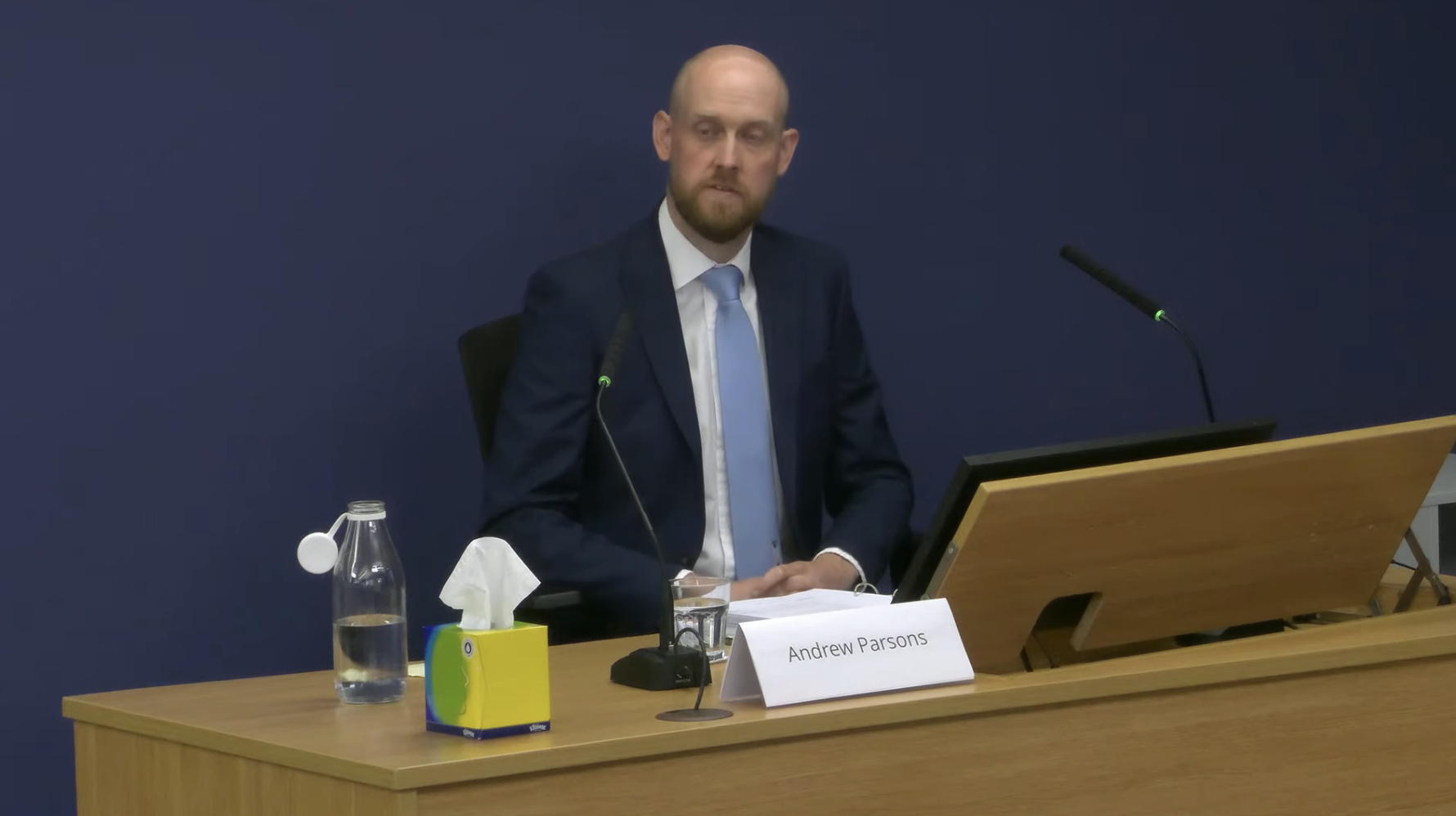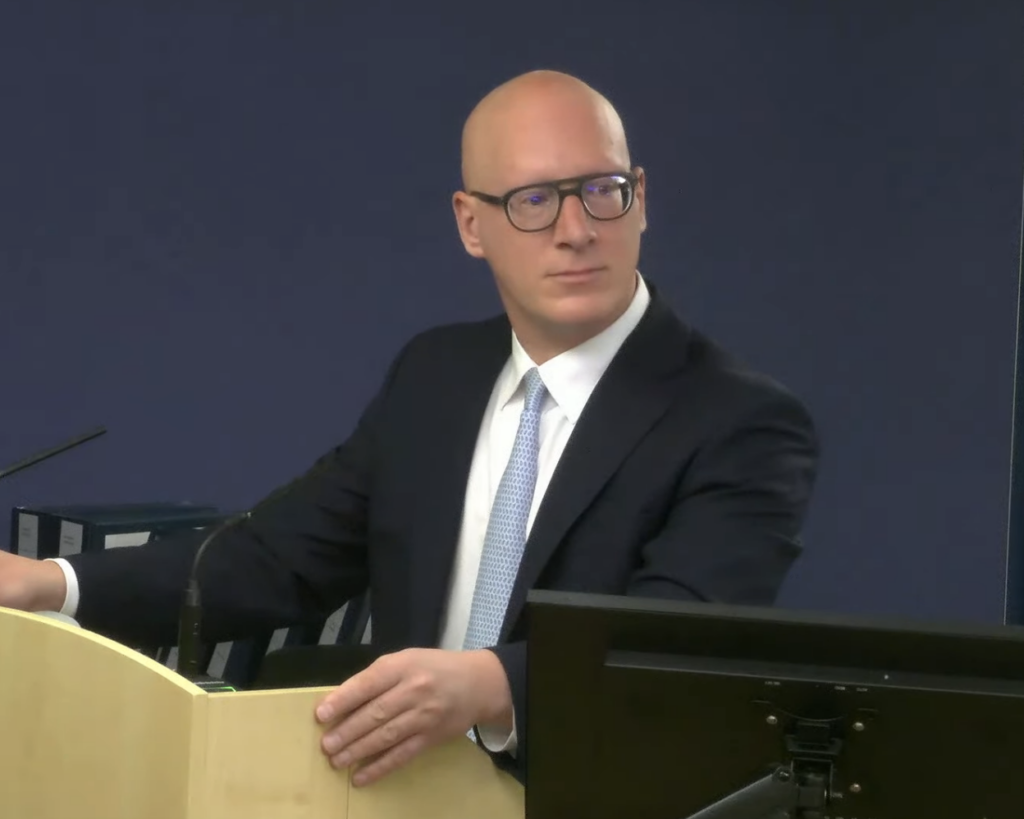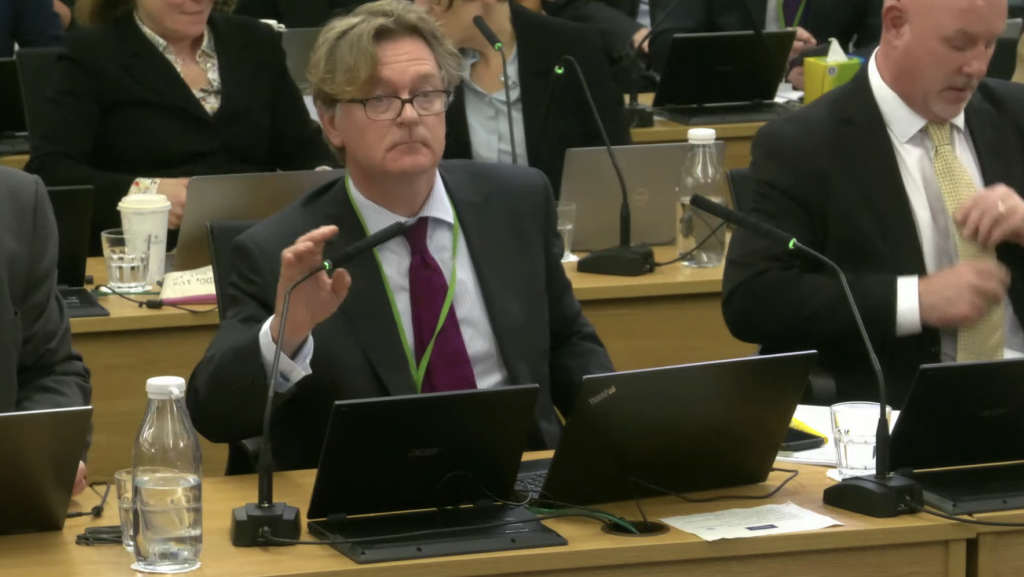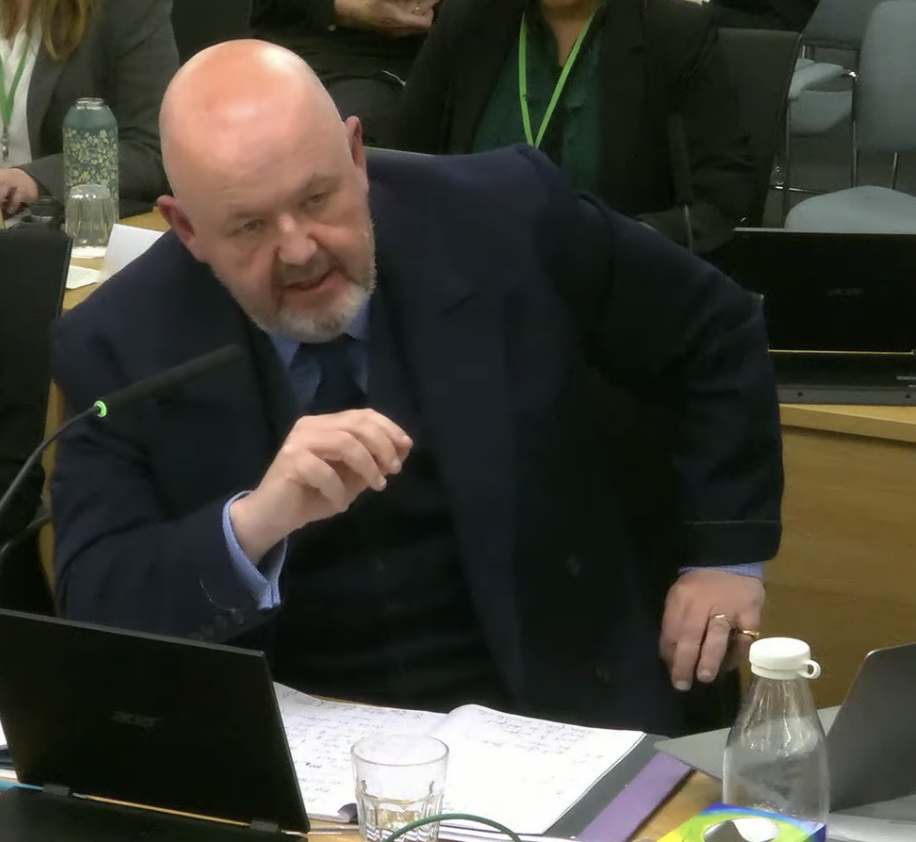
The second day of Andy Parsons’ evidence (see here for a piece on the first) was short with only a few new documents to consider. One was another piece of corroboration that the Post Office strategy during Bates v Post Office – the seminal legal battle which blew the lid off the scandal – was to run the claimants out of road.
Today we saw a document in which Andy Parsons, a Womble Bond Dickinson lawyer tasked with co-ordinated the Post Office’s defence of Bates v Post Office told his colleagues on 1 Nov 2018 (the eve of the first trial): “my instinct is that the claimants’ funding is under pressure and they do not want to be burning money on a third trial”.
His suggestion therefore was to try to “force the claimants to burn money” but do so in a way which achieves the Post Office’s objectives “whilst trying not to look tactical!”
Parsons pointed out the suggestion was made in a discussion document and that “there was always an overarching meritorious reason for recommending a particular course of action” though he admitted “a by-product” of some of those actions during the litigation “may have been to place [financial] pressure on the opposing team”.
Julian Blake, asking questions for the Inquiry, took Parsons back to a litigation strategy document Parsons written for the Post Office in 2017 which stated:
“the better solution is to try to force the claimants into a collective position where they will either abandon the claims or seek a reasonable settlement. It should be remembered that the claims are financially supported by Freeths, whose fees are at least partially conditional on winning, a third party funder and insurers. Without this support, these proceedings would not have been possible. All three entities will likely have the power to pull their support if the merits of the case drop below a certain level. Our target audience is therefore Freeths, the funder and the insurers who will adopt a cold logical assessment of whether they will get a payout rather than the claimants who may wish to fight on principle regardless of merit.”

In response to Blake’s suggestion this was exactly the sort of tactic being discussed in the 2018 document, Parsons argued that: “the key point of that sentence is that it refers to the fact that those entities may pull their support if the merits of the case drop below a certain level.”
Hmm.
Parsons’ Privilege Problem
The Post Office’s borderline paranoid approach to document dissemination was picked over yesterday, but escalated today. It seems as if the Post Office, advised by Parsons, was refusing to give written information about the Bates v Post Office litigation to its only shareholder – the government – and had suggested in a draft protocol that civil servants should only receive oral updates.
The mandarins were more than a bit put out by this. One of them wrote to Rodric Williams (Parsons’ internal counterpart at the Post Office) setting out their position:
Alex Chisholm is the accounting officer for the Post Office and as such is accountable to Parliament for its actions. In order to properly fulfil this role, he requires full and comprehensive information on the progress of this litigation. This will not be possible if the Post Office is not willing to provide written updates. We revised our requirements to provide for updates following reports to the Board to reduce any administrative burden as far as possible, but we cannot agree to a protocol which includes no obligation on the Post Office to report progress in writing in the litigation.
Blake asked what was the problem with giving the shareholder written information about the litigation they were funding.
Parsons replied: “I was aware that there was an issue with information sharing with UKGI, particularly around sharing privileged information with UKGI and how to do it in a way that would maintain privilege.
Blake asked him if this was a concern he “personally” had.
Parsons replied: “I would always be concerned about issues around privilege and making sure the Post Office were properly advising those issues.”
The Mediation Sham

Parsons was one of the architects of the 2013 – 2015 Mediation Scheme. Chris Jacobs, a barrister representing a large group of Subpostmasters asked him a series of questions about it, noting that Parsons took part in two mediations himself and a Womble Bond Dickinson lawyer was at every mediation.
Jacobs told the mediation experience of former Subpostmaster Peter Holloway, one of Jacobs’ clients.
“He says he spent a lot of work preparing for the mediation, turned up, presented what he wanted to say, produced lots of documents in support of his arguments and then everybody went away. The mediator came back to see him at about 3pm, looking “haggard”. The mediator apologised to him and he said, “the Post Office are refusing to make any offer. He couldn’t quite believe it.” He said that the Post Office representatives had been sent to the mediation with express instructions not to settle at all.”
Jacobs told Parsons: “this isn’t just Mr Holloway telling us this, we’ve spoken to at least a dozen other clients who attended mediations and they all say that Post Office sent representatives to the mediation… with no authority or instructions to settle.”
“In practice,” said Jacobs, “the Post Office approach to mediations was disingenuous and amounted to a sham. The Post Office were not mediating in good faith, were they?”
“Each case was assessed on its own merits”, replied Parsons. “Some of those cases we advised the Post Office to settle, some of them we advised the Post Office not to settle. There was then a discussion internally about whether Post Office should still attend mediations where it had no mandate to settle, and the view taken was that it was appropriate still to attend those mediations so that the issues between the parties could be discussed. I can understand why that would have been frustrating for some of your clients, but it was a decision taken in good faith at the time.”
Jacobs was not having this. He quoted the leader of the Justice for Subpostmasters’ Alliance, Alan Bates, who is on the record as saying: “I believe the Post Office had no intention whatsoever of getting to a mutually acceptable conclusion or fair decision. If anything, it seemed as if the Post Office had been using the [Mediation] Scheme as a fishing expedition to see what evidence Subpostmasters actually had about Horizon.”
“Alan Bates is right, isn’t he?”, asked Jacobs. “You were using – and you supervised this – you were using the Mediation Scheme in an adversarial way in a way that to obtain some sort of tactical advantage against the sub-postmasters?”
“I don’t recognise that description of the Mediation Scheme”, replied Parsons.
As a finale, Jacobs told Parsons about an email received that morning from one of his Subpostmaster clients, Sally Stringer. He told Parsons that Stringer had described “you and your evidence as the absolute epitome of arrogance, deceit, corporate corruption and is an absolute disgrace.”
Parsons replied: “I have apologised within my statement and to make it clear, I’ll apologise again now. During my time acting for Post Office, we made some mistakes along the way.”
The Simon Clarke Grenade

Seema Misra’s barrister Ed Henry KC was the next Subpostmaster representative to try to get something out of Parsons. Over the last few weeks, criminal lawyers who have given evidence to the Inquiry, including Simon Clarke and Brian Altman KC, agreed that former Subpostmaster Seema Misra should have been told about the First Clarke Advice, which made it clear beyond any doubt that Gareth Jenkins, the Fujitsu expert witness who had given evidence in her trial, was a tainted witness who had given false evidence in court. Neither Misra nor the Criminal Cases Review Commission was given this information. Henry could not believe this was a mere oversight, failure or mistake.
He told Parsons: “I’m going to suggest that you didn’t make any mistakes at all… there were errors of judgment obviously there were very serious departures from standards that ought to have applied, but what you did was deliberate, it was clear-sighted, it was ruthless.”
“Sorry, you’re asking me to comment on that?” asked Parsons. Henry indicated he was.
“I’m a lawyer acting for Post Office”, stated Parsons. “As a lawyer it’s my responsibility to defend their interests. For a large part of my engagement by post office, my instructions were that they considered the Horizon system to be a reliable system and therefore I defended it along those lines.”
Henry put it to Parsons that his “fundamentalist approach had yawning gaps in it”, which Parsons was well aware of “but you didn’t confront your clients about that did you?” he challenged.
“I don’t think it’s fair to characterise it that way.” Parsons replied.
Henry took him to the Clarke Advice, and suggested that although Parsons was deferring to Brian Altman KC, Simon Clarke and the other criminal lawyers, he was well aware the contents of the Advice should have been disclosed. Worse, he was part of the conspiracy to keep it from her.
“Mrs Seema Misra and her lawyers should have been provided with information of Gareth Jenkins misfeasance as soon as possible after that misfeasance came to light shouldn’t they?” started Henry.
“Looking back on it now that seems that would be my view but at the time that was being advised on by Cartwright King (Clarke’s firm) and Brian Altman and I followed their advice.” Parsons replied.
“What about your fundamental duty to act in a way that upholds justice?” pushed Henry.
“At that time I was not aware that there was any problem with the choices the criminal lawyers have made.”
Henry took him to the letter Parsons drafted to the Criminal Cases Review Commission which failed to mention Gareth Jenkins or the Clarke Advice.
“Isn’t it obvious” asked Henry “that the substance of the Clarke advice, the facts which were not cloaked in privilege, Should have been stated clearly to the CCRC in the holding letter you drafted?”
“At that time I was just drafting a holding letter whilst post office sought advice from their criminal lawyers” replied Parsons.
Henry suggested that “the Clark advice itself is the pin in the grenade” and the Post Office and its lawyers “wanted to keep the pin in the grenade rather than the grenade going off. That’s the truth isn’t it?”
“Not that I can recall at that time” replied Parsons, “but I wasn’t sighted on the decisions that were made on who should get what disclosure and what disclosure should be given.”
And that, more or less, was that.
For the day’s documents and a blow-by-blow account of what happened today, click here.
Day 1 of Parsons’ evidence: Postmasters are liars
The journalism on this blog is crowdfunded. If you would like to join the “secret email” newsletter, please consider making a one-off donation. The money is used to keep the contents of this website free. You will receive irregular, but informative email updates about the Post Office Horizon IT scandal.

Leave a Reply